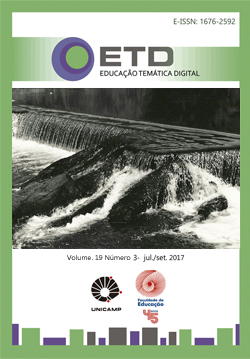Resumo
Como a matemática pode melhor contribuir para a justiça social e a sustentabilidade? A justiça distributiva aborda a pobreza e os problemas relacionados de cima para baixo: movendo o valor extraído da propriedade privada para a propriedade estatal. Mas, a história do socialismo burocrático, da poluição na URSS à escassez de alimentos na Venezuela, mostra tantos problemas quanto o capitalismo. A justiça generativa, ao contrário, funciona de baixo para cima: substitui a extração de valor e a alienação pela circulação de valores. Esses ciclos geradores incluem os trabalhos não alienados, como, por exemplo, os espaços de produção e os códigos abertos; valores ecológicos não alienados como a agricultura orgânica e valores expressivos não alienados como a diversidade sexual, as artes liberadas e outras liberdades polissêmicas. Este ensaio revisará 3 aspectos das etnociências (etnomatemática, etnocomputação e disciplinas relacionadas) em relação à justiça generativa. No caso dos sistemas de conhecimento indígena, há um perigo de alienação do valor à medida que os conceitos são traduzidos em modelos e, posteriormente, abstraídos em currículos de sala de aula. No caso dos sistemas de conhecimentos vernaculares, a colonização por interesses comerciais já ocorreu, e o desafio é desenvolver uma alternativa descolonizada. Finalmente, no caso das relações entre a escola e a comunidade, um ciclo generativo completo pode incorporar fluxos de valores econômico, de saúde e ambientais, alavancando essas abordagens generativas CTEM (Ciências, Tecnologias, Engenharia e Matemáticas). Este ensaio fornecerá, ambos, a teoria e alguns resultados iniciais dessa abordagem generativa CTEM para um mundo mais justo e sustentável.
Referências
BENKLER, Yochai. Practical anarchism: peer mutualism, market power, and the fallible state. Politics and Society, v. 4, n. 2, p. 213-251, 2013.
BENNETT, Audrey. Ethnocomputational creativity in STEAM education: a cultural framework for generative justice. Teknokultura. Journal of Digital Culture and Social Movements, v. 13, 2016. Retrieved from: http://revistas.ucm.es/index.php/TEKN/article/view/52843.
BENNETT, Audrey; EGLASH, Ron; LACHNEY, Michael; BABBITT, William. Design agency: diversifying computer science at the intersections of creativity and culture. In RAISINGHANI, M. (Ed.). Revolutionizing Education through Web-Based Instruction. Hershey, PA: IGI Global, 2016. pp. 35-56.
BENNETT, Audrey; CASSIM, Fatima; VAN DER MERWE, Marguerite; VAN ZIJL, Karen; RIBBENS, M. Designing South African children’s health education as generative play. Proceedings of the International Association of Societies of Design Research, Queensland University of Technology, 2015.
BUECHLEY, Leah; HILL, Benjamin, M. LilyPad in the wild: how hardware’s long tail is supporting new engineering and design communities. Proceedings of Designing Interactive Systems. New York, NY: ACM, 2010. pp. 199-207.
CLUIS, Corinne. Bioprospecting: a new western blockbuster, after the gold rush, the gene rush. The Science Creative Quarterly, v. 8, 2013. Retrieved from: http://www.scq.ubc.ca/bioprospecting-a-new-western-blockbuster-after-the-gold-rush-the-gene-rush/.
EGLASH, Ron; BANKS, David A. Recursive depth in generative spaces: democratization in three dimensions of technosocial self-organization. The Information Society, v. 30, n. 2, p. 106-115, 2014.
EGLASH, Ron, BENNETT, Audrey, O’DONNELL, Casey, JENNINGS, Sybillyn, CINTORINO, Margaret. Culturally situated designed tools: ethnocomputing from field site to classroom. American Anthropologist, v. 108, n. 2, p. 347-362, 2006.
EGLASH, Ron; GARVEY, Colin. Basins of attraction for generative justice. In BANERJEE, Santo, ERÇETIN, Şefika Şule, TEKIN, Ali (Eds.). Chaos Theory in Politics. Netherlands: Springer, 2014. p. 75-88.
EGLASH, Ron. An introduction to generative justice. Teknokultura, v. 13, n. 2. Retrieved from: https://www.researchgate.net/publication/311811471_An_Introduction_to_Generative_Justice. 2016b.
DRAZAN, John F.; COOKE, Laquana; EGLASH, Ron. Harmonious integration: tuning STEM education with generative justice. IEEE Integrated STEM Education Conference. Princeton, NJ: ISEC, 2016. Pp. 58-64. Retrieved from: https://www.researchgate.net/publication/301914824_Harmonious_integration_Tuning_STEM_education_with_generative_justice.
DUNBAR-HESTER, Christina. Freedom from jobs or learning to love to labor? Diversity advocacy and working imaginaries in open technology projects. Teknokultura, v. 13, n. 2, p. 541-566, 2016.
JHALLY, Sut. Cultural studies and the sports/media complex. In WENNER, L. A. (Ed.). Media, sports, and society. Newbury Park, CA: Sage Publications, 1989. pp. 70-96.
LACHNEY, Michael, BENNETT, Audrey, APPIAH, J.; EGLASH, Ron. Modeling in ethnocomputing: replacing bi-directional flows with recursive emergency. International Journal for Research in Mathematics Education, v. 6, n. 1, p. 219-243, 2016a.
LACHNEY, Michael; BABBITT, William; EGLASH, Ron. Content aware software design in the ‘construction genre’ of learning technology. Software Studies, v. 5, Special Issue, 2016b. Retrieved from http://computationalculture.net/article/software-design-in-the-construction-genre-of-learning-technology-content-aware-versus-content-agnostic.
LACHNEY, Michael. Culturally responsive computing as brokerage: toward asset building with education-based social movements. Learning, Media and Technology, p. 1-20, 2016. DOI: 10.1080/17439884.2016.1211679.
LYLES, Dan.; LACHNEY, Michael; FOSTER, Ellen K.; ZATZ, Zoe. Generative contexts: generating value between community and educational settings. Teknokultura, v. 13, n. 3, p. 613-637, 2016.
LIPKA, Jerry; HOGAN, Maureen, P.; WEBSTER, Joan P.; YANEZ, Evelyn; ADAMS, Barbara; CLARK, Stacy; LACY, Doreen. Mathematics in a cultural context: two case studies of a successful culturally based mathematics project. Anthropology & Education Quarterly, v. 36, n. 4, p. 367–385, 2005.
MARX, Karl. Capital. Volume I. New York, NY: Vintage, 1976.
MITCHEL, Melanie. Complexity: a guided tour. New York, NY: Oxford University Press, 2009.
ROSA, Milton; OREY, Daniel Clark. Ethnomodeling as a research theoretical framework on ethnomathematics and mathematical modeling. Journal of Urban Mathematics Education, v. 6, n. 2, p. 62–80, 2013.
ST. JOHN, Warren. Sandlot baseball: diamonds in the rough. Garden & Gun, 2014. Retrieved from: http://gardenandgun.com/article/sandlot-baseball-diamonds-rough.
A ETD - Educação Temática Digital utiliza a licença do Creative Commons (CC), preservando assim, a integridade dos artigos em ambiente de acesso aberto.

